Filter by
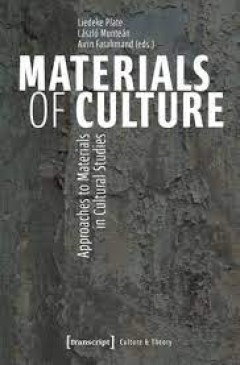
Materials of Culture Approaches to Materials in Cultural Studies
While the so-called material turn in the humanities and the social sciences has inspired a vibrant discourse on objects, things, and the concept of materiality in general, less attention has been paid to materials, particularly in cultural studies scholarship. With each of its chapters taking a particular material as its point of departure, this volume offers a palette of fresh approaches to ma…
- Edition
- -
- ISBN/ISSN
- 9783839466971
- Collation
- -
- Series Title
- -
- Call Number
- -

Lawmaking for Development. Explorations into the Theory and Practice of Inter…
This volume discusses how legislation (the product) and lawmaking (the process) function in developing countries, and how legislation contributes to development and how lawmaking and legislation can be improved either by the country itself or by donor assisted projects. It covers topics including legal transplantation, legislative quality, linkages between legislation and implementation, and th…
- Edition
- -
- ISBN/ISSN
- 9789087280468
- Collation
- -
- Series Title
- -
- Call Number
- -
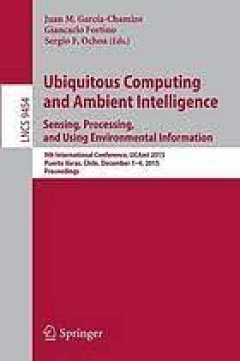
Ubiquitous Computing and Ambient Intelligence. Sensing, Processing, and Using…
This book constitutes the refereed proceedings of the 9th International Conference on Ubiquitous Computing and Ambient Intelligence, UCAmI 2015, held in Puerto Varas, Chile, in December 2015. The 36 full papers presented together with 11 short papers were carefully reviewed and selected from 62 submissions. The papers are grouped in topical sections on adding intelligence for environment adapt…
- Edition
- -
- ISBN/ISSN
- 978-3-319-26401-1
- Collation
- -
- Series Title
- -
- Call Number
- -
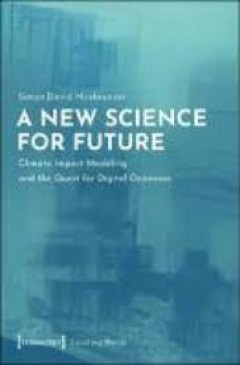
A New Science for Future Climate Impact Modeling and the Quest for Digital O…
Building on concepts from Science & Technology Studies, Simon David Hirsbrunner investigates practices and infrastructures of computer modeling and science communication in climate impact research. The book characterizes how scientists calculate future climate risks in computer models and scenarios, but also how they circulate their insights and make them accessible and comprehensible to others…
- Edition
- -
- ISBN/ISSN
- 9783839452653
- Collation
- -
- Series Title
- -
- Call Number
- -

Trust and Trustworthy Computing 8th International Conference, TRUST 2015, He…
This book constitutes the refereed proceedings of the 8th International Conference on Trust and Trustworthy Computing, TRUST 2015, held in Heraklion, Crete, Greece, in August 2015. The 15 full papers and 3 short papers presented in this volume were carefully reviewed and selected from 42 submissions. They were organized in topical sections named: hardware-enhanced trusted execution; trust an…
- Edition
- -
- ISBN/ISSN
- 978-3-319-22846-4
- Collation
- -
- Series Title
- -
- Call Number
- -

Trust Management IX 9th IFIP WG 11.11 International Conference, IFIPTM 2015,…
This book constitutes the refereed proceedings of the 9th IFIP WG 11.11 International Conference on Trust Management, IFIPTM 2015, held in Hamburg, Germany, in May 2015. The 10 revised full papers and 5 short papers presented were carefully reviewed and selected from 28 submissions. In addition, the book contains one invited paper and 5 papers from a special session on trusted cloud ecosystems.…
- Edition
- -
- ISBN/ISSN
- 978-3-319-18491-3
- Collation
- -
- Series Title
- -
- Call Number
- -
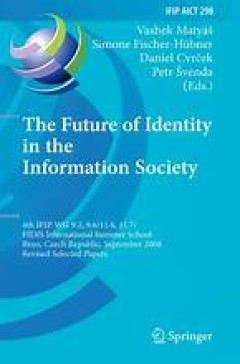
The Future of Identity in the Information Society
What constitutes an identity, how do new technologies affect identity, how do we manage identities in a globally networked information society? The increasing div- sity of information and communication technologies and their equally wide range of usage in personal, professional and official capacities raise challenging questions of identity in a variety of contexts. The aim of the IFIP/FIDIS Su…
- Edition
- 1
- ISBN/ISSN
- 978-3-642-03315-5
- Collation
- X, 283
- Series Title
- IFIP Advances in Information and Communication Technology
- Call Number
- -

Migration and Hybrid Political Regimes Navigating the Legal Landscape in Russia
While migration has become a vital issue worldwide, mainstream literature on migrants’ legal adaptation and integration has focused on cases in Western-style democracies. We know relatively little about how migrants adapt in the ever-growing hybrid political regimes that are neither clearly democratic nor conventionally authoritarian. This book takes up the case of Russia—the third largest …
- Edition
- -
- ISBN/ISSN
- 9780520971257
- Collation
- -
- Series Title
- -
- Call Number
- -
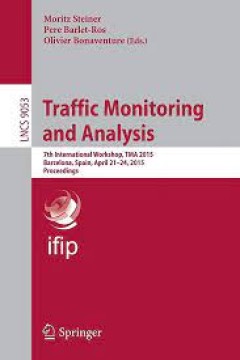
Traffic Monitoring and Analysis 7th International Workshop, TMA 2015, Barcel…
This book constitutes the refereed proceedings of the 7th International Workshop on Traffic Monitoring and Analysis, TMA 2015, held in Barcelona, Spain, in April 2015. The 16 full papers presented in this volume were carefully reviewed and selected from 54 submissions. The contributions are organized in topical sections on measurement tools and methods; mobile and wireless; Web; security; an…
- Edition
- -
- ISBN/ISSN
- 978-3-319-17172-2
- Collation
- -
- Series Title
- -
- Call Number
- -

Tools of Transport Telematics 15th International Conference on Transport Sys…
This book constitutes the proceedings of the 15th International Conference on Transport Systems Telematics, TST 2015, held in Wrocław, Poland, in April 2015. The 35 revised full papers and two short papers included in this volume were carefully reviewed and selected from 115 submissions. The papers provide an overview of solutions being developed in the fields of transport telematics and inte…
- Edition
- -
- ISBN/ISSN
- 978-3-319-24577-5
- Collation
- -
- Series Title
- -
- Call Number
- -
 Computer Science, Information & General Works
Computer Science, Information & General Works  Philosophy & Psychology
Philosophy & Psychology  Religion
Religion  Social Sciences
Social Sciences  Language
Language  Pure Science
Pure Science  Applied Sciences
Applied Sciences  Art & Recreation
Art & Recreation  Literature
Literature  History & Geography
History & Geography